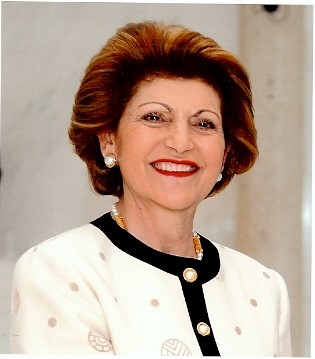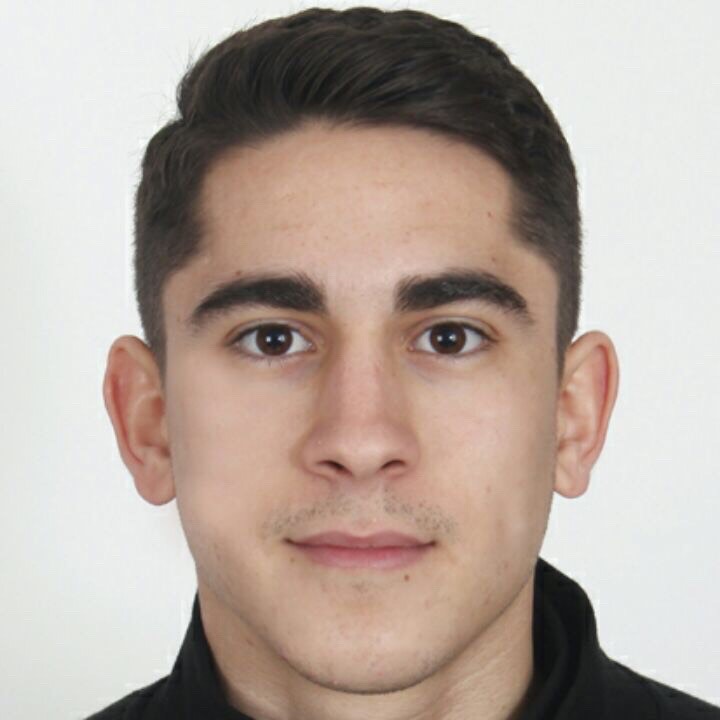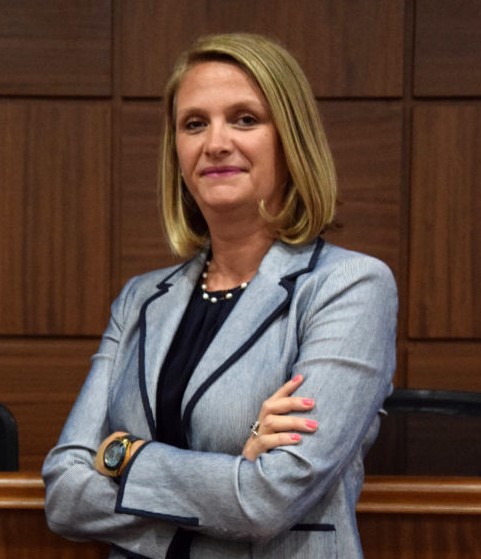
Posted on September 1, 2020
A message from the interview coordinator:

Dear Readers, my name is Andrea Manoli. I am a Research Scholar at the School of Law of UCLan Cyprus and one of the academics involved in the UCLan Cyprus Law Blog http://lawblog.uclancyprus.ac.cy/. A law graduate with an LLM in International Commercial law, a Master of Arts in Security and Diplomacy, a TEFL and a Professional Certificate in Arbitration. My work in both the legal profession and in political institutions offered me a better understanding of the cultural relativism of societies and the hardships of being established in what is perceived as male-dominated professions. It is thus, with a great pleasure that I am coordinating this inspiring initiative.
Interviewers:

My name is Tasos Andreou and I am 22 years old. I am an undergraduate law student at UCLan Cyprus approaching to the end of year three, before advancing to the fourth and final year. I am a Greek Cypriot residing in Larnaca, with a family background of a displaced father born, but not raised, in Makrasyka, Famagusta. I graduated from the American Academy Larnaca in 2017. I am a highly active and athletic individual having been involved in professional football for the past 15 years. I am eager to pursue a career in the field of law and/or politics, particularly in Diplomacy.

My name is Nicoletta Savvidou. I am 24 years old and I live in Larnaca. I am a third-year law student at the University of UCLan Cyprus. I am interested in European Union Law, political affairs, human rights and justice. I am aiming in earning experiences which will provide me with more opportunities for my future career that will therefore enable me to work within the framework of the European institutions and organisations.
Introduction:
One can gain important insights into the effect of cultural relativism and gender equality, amongst other things, by interviewing figures who by defying the thorns, obtained a place in history. Moreover, during really troubled times, where insecurity became part of our everyday life due to the Covid-19 pandemic, the perceptions by successful professionals of both the legal and political sphere are of the essence. Thus, in appreciation of gender equality and professional empowerment, the UCLan Cyprus Law Blog introduces Mrs Androula Vassiliou. Mrs Vassiliou is very active in the social and cultural fields, particularly within the UN and the EU. In Cyprus and the EU, she has held many important posts and is on the board of many public and private companies.
AV: Before replying to the questions, let me give you some background facts which will help you understand and appreciate my answers. In 1961, when I left for my university studies in London, I was 17 and a half years old and with the exception of a school group – excursion to Greece, I had never separated from my family before. At that time, just 1% of female graduates of secondary education went abroad to study at a university and of course there was no university in Cyprus at the time. When I completed my pupillage as a lawyer and registered as a lawyer, I was no. 13 on the registrar, which meant that we were just 13 female lawyers in the whole of Cyprus. In contrast, nowadays, there are more than 1800 female lawyers in Cyprus, exceeding the number of male lawyers. However, still a limited number of law firms include female partners. The majority of female lawyers working in law firms are employees and not partners.
TA/NS: Can you please introduce yourself in terms of professional/educational qualifications?
AV: I graduated from the Pancyprian Gymnasium of Nicosia in 1961 and because of my excellent marks, I was immediately admitted at the Middle Temple Inn of Court, in London, to study Law. I passed my final exams before I was 21 years of age and, as a result, I had to wait until I became of age to be called to the English Bar. I was called to the Bar in April 1964.
In the meantime, I did a three-month practical course in London, which was organised for young Barristers who intended to practise in countries with a fused profession (no division between Barristers and Solicitors, like in Cyprus).
I also applied and was accepted to the University College, London, to do a two-year Diploma course in International Affairs which I completed in August 1966, before returning to Cyprus.
I did my legal practical training for six months at the PL Cacoyiannis Law Firm in Limassol (one of the most reputable Law offices in Cyprus. Sir Panayiotis Cacoyiannis was a Queen’s Counsellor). At the end of this period, I was accepted and registered as a practising lawyer in Cyprus.
TA/NS: As an active person in politics in the past, being twice elected to the Cypriot House of Representatives (from 1996 to 2006, representing the Movement of United Democrats), how important are politics, if at all, in the field of law?
AV: Politics has a strict and a wider meaning. I believe that politics in the wider sense is very important in the field of Law because it is crucial for a practising lawyer to understand and appreciate the political environment, both local and international, in which he/she works. We do not live and work in a vacuum and therefore, as lawyers we must become interested, learn and understand what is happening around us in the field of politics.
TA/NS: Being actively involved in political affairs both at the national and European level, how have you dealt with media exposure and peoples’ treatment?
AV: As a female politician in Cyprus between 1996-2006, in a way I was treated as someone unusual. After all, when I was first elected in Parliament, we were just three female MPs and later on six. I was personally treated with respect but I could always sense that my voice and opinion did not count as much as that of male colleagues. We were seldom asked to participate in TV panel discussions on topics of political or economic significance. We were remembered in debates having to do with social, educational or humanitarian aspects and in times of elections, female candidates were asked to participate in all-female panels as opposed to mixed panels.
The situation was different when I became involved in European politics as European Commissioner. We were, at the time, nine out of 28 commissioners and there was absolutely no gender discrimination. We were all treated with respect and our voice counted as much as that of our male colleagues. In College, whether a proposal originated from A or B or C Commissioner, all 28 Commissioners had the right to express his/her opinion before a decision was taken by the College and had the right to demand a vote if he/she thought it was needed. Equally European medias treated all of us the same way without any discrimination and gave us the opportunity to express our opinion if it was needed.
TA/NS: How difficult was it for you, as a woman, to commence your career in what was a male-dominated profession? Have you received equal treatment, equal opportunities and respect within the workplace?
AV: In answering this question I still feel resentment and anger.
PL Cacogiannis Law office, having first-hand experience of my abilities, offered me immediate employment in Limassol as soon as I obtained my licence to practise law. Unfortunately, however, family reasons obliged me to seek work in Nicosia. I knocked at various doors of big law firms but nobody was willing to offer work to a young unknown female lawyer. I was very disheartened but my husband who had lived in Europe for more than a decade and was very broad-minded, encouraged me not to succumb to despair and to open my own law office, which I did. It was not at all easy as I did not have big connections at the time. But with patience I managed year by year to create my own clientele. Very often I experienced overt discrimination from my clients. For example, if a case reached a very critical point and important decisions had to be taken, the client’s (usually male clients) usual reply was: “Let me take also the opinion of a male lawyer….”
I did not experience discrimination from colleagues or judges until the following incident which marked my subsequent career.
After six years of practice I felt I was the right person to be appointed as a judge. There were no female judges at the time. Therefore in 1973 I was the first female lawyer to submit my application for an appointment to the Bench. The rules demanded six years of practice which I had and I was also the only candidate with postgraduate studies. But the Judicial Committee was interested to know whether my intention was to have another child and when I replied, ‘Yes’, they all reacted and said they did not think it was appropriate to have a pregnant woman on the Bench. They proceeded in changing the rules to demand only 3 years of practice and appointed a young male lawyer with three years of practice. Later, by way of a joke, one of the Supreme Court Judges told my father: “Why is your daughter interested in becoming a judge? Take her home and let your wife teach her cooking”. From that time onwards, I knew that at the right time I would abandon legal practice.
TA/NS: What has been the driving force behind your achievements, being, amongst others, the position of European Commissioner of Health, a Commissioner of Education, Culture, Multilingualism and Youth?
AV: The driving force behind me were two men: my father, who not having the possibility to go to university himself always aspired to educate his two daughters and encouraged me to do so. Subsequently my husband encouraged me first to open my own law office, later to run for Parliament and lastly when the President of Cyprus proposed to me to go to Brussels and become a Commissioner, my husband and my children encouraged me to accept, despite the fact that my husband knew that this meant he would be left alone. In the same way I supported my husband when he ran for President and I was next to him all the way. So I strongly believe that without support from your spouse, a married person cannot go far, and I speak for men and women.
TA/NS: What was the reason behind your active involvement in numerous organisations and commissions in the field of Human Rights and Gender Equality as Founding Member?
AV: I believe that my inherent sense of justice led me to become involved in the field of Human Rights and in particular, the rights of women. As early as 1968, at the age of 25, I was actively involved in the organisation of the first international seminar on human rights, in Cyprus, upon the instigation of the then Judge of the Supreme Court, Michael Triantafyllides. He also encouraged me to become actively involved with the work of the United Nations Association of Cyprus, of which I later became Secretary General and finally President. This also led me to become involved with the work of the World Federation of United nations Associations (WFUNA) of which I was elected President in 1991.
As far as Gender Equality is concerned, I was never a feminist in the traditional meaning of the word. However, experiencing discriminations by myself or many other women could not leave me in apathy. As far back as the beginning of the ‘80s, together with a group of other women, we played an important role in bringing about changes to the Constitution of the Church of Cyprus which laid down the rules regarding all family matters, which were very unfair and unjust towards women eg grounds of divorce. Since then I did not stop working for the promotion of the status of women.
TA/NS: You have served for almost ten years as Secretary General and later as President of the United Nations Association of Cyprus. Also, in 1991- 1995, you were elected President of the World Federation of United Nations Associations (WFUNA). Do you believe that there will be continuity among the younger generation in regards to your active involvement within different organisations in the field of Human Rights and Gender Equality?
AV: Let me remind you that at the time of my active involvement with the work of the United Nations, we had the ‘Cold War’ and the relations between the East and the West were very tense. The United Nations were created and played a very important role as a Forum where all Member States met and discussed their problems. As a result, tensions were eased and a third world war was avoided. In Cyprus the United Nations and its Peace Keeping Force played an important role in keeping the peace for decades. Moreover, let us not forget the important role played all these years by its Specialized Agencies such as UNESCO, UNHR, ILO, WHO, UNICEF and others.
Although the role of the UN has decreased in the last decades especially since the fall of the Berlin War and the lifting of the ‘Iron Curtain’, I believe that younger generations should support is work and especially that of its Specialized Agencies on whose work the world relies so much!
TA/NS: Is there any other non-governmental organisation that you would like to establish for the needs of the modern society?
AV: Personally, I do not intend to be actively involved in setting up a new NGO. There is a great number of NGOs around, involved in various fields. What is needed is more coordination and more cooperation between them in order to become more efficient and more effective. I also hope to see more young people become actively involved in their work. The young people should now take up the baton from the older generation and lead their work forward.
TA/NS: What recommendations/advice would you provide to the youth willing to pursue a similar European career?
AV: My advice to the youth of today is “Do not miss any opportunities that are given to you”. I know that sometimes you think that this is not the right opportunity for me, it is below my expectations or my ambitions. But one opportunity leads to another and finally you reach the top. Take it and prove yourself. Others do not know you. You have to prove your abilities to them.
You also have to be well organised and well prepared with everything that you do. Others must be convinced that they can rely on you and that they can trust you.
Lastly, whatever academic qualifications you may get, transversal skills are also very important: Take initiatives, become independent, be involved in teamwork, face difficulties with courage….
TA/NS: As a former EU Commissioner for Health, what kind of crisis situation did you face during that time? What lessons can be drawn from this and applied to the current COVID-19 health crisis?
AV: As EU Commissioner responsible for Health in 2008 – 2010, I had to face another health pandemic the so-called Swine Flew, H1N1. Although this pandemic did not develop to as deadly a virus as the present COVID-19, it taught me great lessons and gave me great experience of how to deal with crises and emergencies. No 1 prerequisite: You have to remain calm and composed No 2: you have to act quickly No 3: you have to coordinate the actions of all Member States and No 4: you have to utilise all tools available in order to obtain results.
My other important experience was when I had to face serious food crises, like contamination of baby milk, contamination of cooking oil or pork or cheese, in which cases I had to act immediately in order to give orders to all Member States to withdraw immediately these contaminated food from their shelves. Quick response saves lives.
TA/NS: Is gender diversity and equity still a topic of discussion in the legal professions in Cyprus? Did you experience gender-based discrepancies in European institutions?
AV: Nowadays the participation of women in the legal profession is taken for granted. We have women in various positions but I still believe that women are bound in some extent by institutional racism. I have never experienced the same treatment in European institutions.
Concluding remarks by Prof. Stéphanie Laulhé Shaelou

Dear all, on behalf of all of us at the School of Law of UCLan Cyprus, I would like to warmly thank our interviewee for her time and inspiration, as well as our interviewers and interview coordinator. In times of COVID-19 pandemic, we thought it was important to disseminate this interview in view of the fact that the School of Law’s Annual Dinner to be held on 20 March 2020, with keynote speaker Ms. Androula Vasiliou, was postponed until further notice (https://www.uclancyprus.ac.cy/school-of-law-annual-lecture-and-dinner/ ). We are therefore delighted to bring to you this interview, in the comfort of your home, and would like to encourage you to reflect on the important messages contained in this interview.
Enjoy your reading!
The UCLan Cyprus Law Blog Team
Posted in Gender Equality, Human Rights